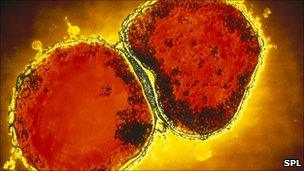Meningitis jab ‘protection hope’
- Published

Meningitis is a major cause of death in children
A vaccine against one of the most common forms of childhood meningitis could reduce the number of deaths in the UK even further.
The current vaccination programme protects against only some of the bacterial types involved.
A Chilean study, reported in The Lancet medical journal, found more evidence the new vaccine works against the B form of the disease.
This causes about 2,000 cases in the UK each year, mostly in the under-fives.
The meningitis vaccine programme here is thought to have saved many hundreds of lives over the past decade.
However, meningitis B has been an elusive target for vaccine developers, as it is a group of thousands of subtly-different strains of bacteria, making it difficult to find a single jab that could cover them all.
So while four other major strains are included in the vaccine, the danger from meningitis B remains.
Inflammation
The infection, which causes inflammation of membranes surrounding the spinal cord and brain, still causes more than 100 deaths a year, with many more children suffering serious and potentially disabling illness.
Scientists produced the "4CMenB" vaccine by analysing the genetic structure of thousands of B strains, looking for shared features which could be targeted.
There have already been encouraging results when given to toddlers, and the latest study, carried out by University of Chile scientists, looked at its effectiveness when given to 11 to 17-year-olds.
More than 60% of bacterial meningitis cases in Chile involve type B, but two doses of the vaccine appeared to offer almost 100% protection.
The researchers said that the vaccine could now be considered for vaccination programmes in countries where the B type was prevalent, including many in Europe, and the United States.
Dr Myron Christodoulides, a senior lecturer in Molecular Microbiology at the University of Southampton, said that the full range of type B strains covered by the vaccine was not yet proven.
He said: "Previous studies have shown that 4CMenB has the potential to provide significant protection when administered to infants - this new study shows it could also be highly protective in the adolescent age group.
"However, there are still a number of important questions to be answered such as how many strains it will protect against, how long the protection will last and whether it will stop the bacteria from being passed on to others, providing indirect protection to those not vaccinated."
Kate Rowland, from Meningitis UK, added: "The UK is a hot spot for meningitis B, with one of the highest incidence rates of the disease in the world.
"Scientists have been trying to develop a vaccine against it for years but it has been very challenging as its capsule is similar to the structure of human nerve cells and the bacteria is clever, mutating and adapting."